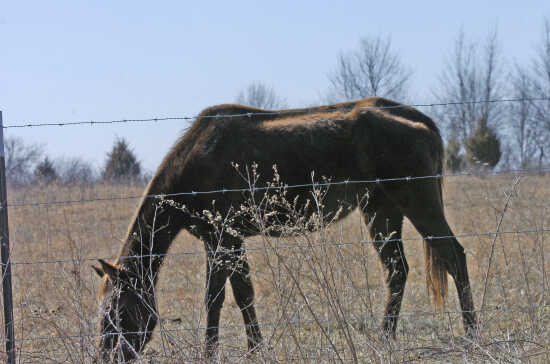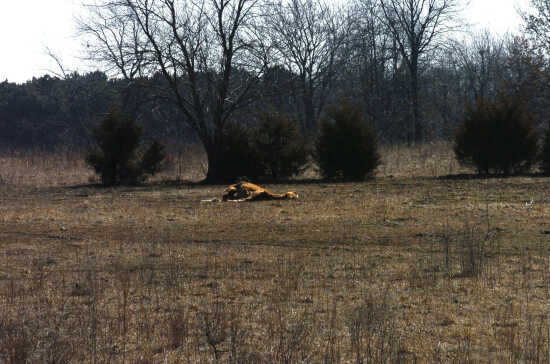Several horses die at local farm: Owner says he's complying with recommendations of authorities

Buzzards wheeled overhead on Monday, March 29, as a concerned man pointed across his neighbor's pasture to yet another dead horse, only one of more than a dozen horses to die on the southeast Vernon County farm in the past six months or so. "Yeah, the buzzards and coyotes are thicker than all get out, because they've got all they can eat," said Paul Feagan.
Since 2008, Feagan has counted more than 30 dead horses on the property across the lane from his home of 22 years. The pasture and the horses in it belong to Thomas Reardon. It is very disheartening to have to stand by and watch the animals die, Feagan indicated. He has seen them go for long stretches with no hay, even in the depths of winter. There was one period of two weeks this past winter when the animals apparantly had no hay. "I watched them wither away and it just makes me sick," said Feagan.
For some time now, Feagan has been trying to get something done about the situation he sees every day as soon as he walks out of the house to feed his own horses and other animals. Finally, more than a month ago, Feagan decided to take some definite action. He has called the Humane Society in Kansas City and St. Louis. He has called People for the Ethical Treatment of Animals, the Vernon County Sheriff's Office and the state veterinarian.

Feagan called the sheriff's office again on Friday, March 26, because the horse that had most recently died was near the hay bales where the other horses were feeding and congregating. "It should have been hauled off," he said. "They have been stomping all over it."
Even though there has been some action taken, Feagan thinks it's too little. The Missouri Department of Agriculture's district veterinarian was on the Reardon property on March 4 and instructed Reardon on how to dispose of the carcasses scattered across the pasture.
Royce Wilson, from the Harrisonville office of the Department of Agriculture said the only law he could enforce was "the dead animal disposal law." Wilson said, "I just glanced at them, [the live horses] I did not do any diagnostics." Wilson did give Reardon some recommendations on disposal. In a telephone interview, Wilson said, Reardon needed to "break them up in smaller groups." He also said the horses needed to be wormed and fed some grain. "There are too many horses on too small a piece of ground," he said.
That problem is taking care of itself, or rather, the cruel hand of nature is taking care of it. Since that visit early in the month, two other horses have died and one, "a colt, was down and laying there suffering, it was thrashing around," said Feagan. It had to be euthanized, he said. The state vet made another visit to the farm and at least two other veterinarians have been there as well.
With hip bones and vertebrae showing even through the thick winter coats of some of the animals, the rest of horses cluster around the hay bales Reardon has placed in the field. When the animals walk, they move lethargically as though they are dazed or like their feet hurt. Reardon insists he has done his part to ensure the health of the remaining animals. "I've complied with everything they wanted me to do," he said in a telephone interview.
The animals have "ample feed and water," he said and they have been wormed. "They got set back during the winter because of the worm infestation," Reardon said. He also stated that latest animal to die will be disposed of according to the recommendations of the state veterinarian as soon as he can get into the muddy field with his truck and drag the carcass to a suitable place.
Reardon claims he bought a bunch of old horses and that, "sometimes they make it and some of them don't," Reardon said.
Feagan says he doesn't know what is going to happen from here and remains concerned for the animals' welfare in the future, expressing doubt that Reardon will maintain his recent efforts in giving more attention to the horses' needs. He and other concerned people have made numerous calls to the Vernon County Sheriff's Office. Deputies have been to the farm and seen the horses firsthand. A number of photographs of the dead horses have been delivered to the office, but thus far no charges have been filed.
Sheriff Ron Peckman did say that the paperwork in the case had been delivered to the Vernon County prosecutor's office, but Vernon County Prosecutor Lynn M. Ewing III returned it for further investigation.
"We are still working on that," Peckman said. Ewing said he has issued subpoenas for veterinary records from the three veterinarians who have visited the farm.
Feagan just wants the horses cared for.
He and others have offered to purchase some of the animals, he said, and they were told to leave the property. In the end, Feagan said, "I would like to see these horses taken away from him, returned to health and adopted out. And I'd like to see that he can't buy any more."
